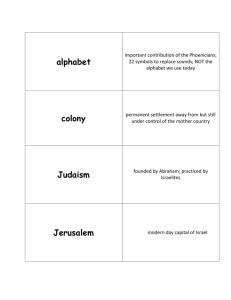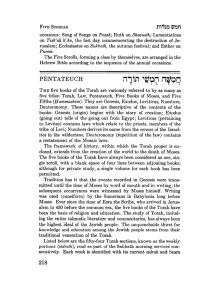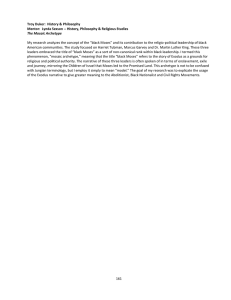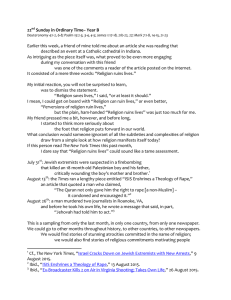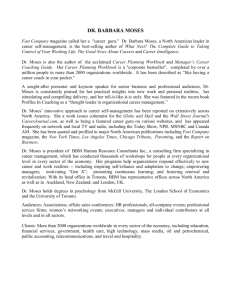TASTE TEXT of a
advertisement
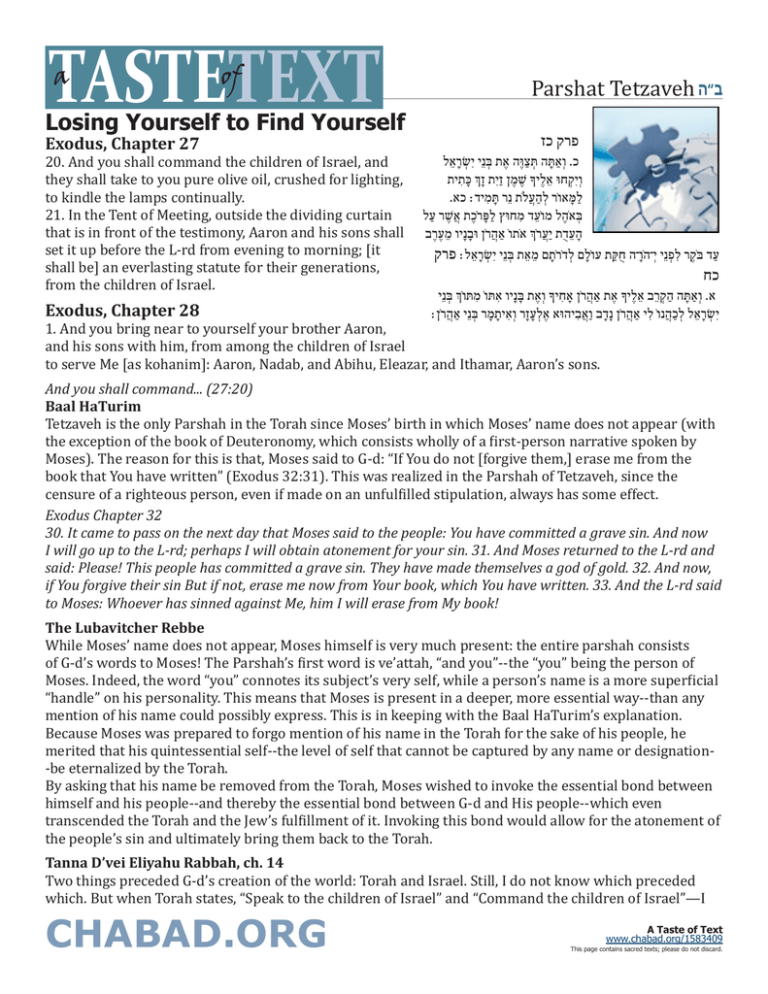
TASTETEXT a of Losing Yourself to Find Yourself Exodus, Chapter 27 20. And you shall command the children of Israel, and they shall take to you pure olive oil, crushed for lighting, to kindle the lamps continually. 21. In the Tent of Meeting, outside the dividing curtain that is in front of the testimony, Aaron and his sons shall set it up before the L-rd from evening to morning; [it shall be] an everlasting statute for their generations, from the children of Israel. Exodus, Chapter 28 Parshat Tetzaveh ב”ה פרק כז ְואַ ּתָ ה ּתְ צַ ּוֶה אֶ ת ּבְ נֵי י ְִׂשרָאֵ ל.כ וְ יִקְ חּו אֵ לֶ יָך ׁשֶ מֶ ן ַזיִת זְָך ּכָ תִ ית . כא:לַ ּמָ או ֹר לְ הַ עֲֹלת נֵר ּתָ ִמיד ּבְ א ֹהֶ ל מו ֹעֵ ד ִמחּוץ לַ ּפָ ר ֹכֶ ת אֲׁשֶ ר עַ ל הָ עֵ דֻת ַי ֲער ְֹך א ֹתו ֹ ַא ֲהר ֹן ּובָ נָיו מֵ עֶ רֶב פרק:עַ ד ּב ֹקֶ ר לִ פְ נֵי יְ־הֹוָ־ה חֻ ּקַ ת עו ֹלָ ם לְ דֹר ֹתָ ם מֵ אֵ ת ּבְ נֵי י ְִׂשרָאֵ ל כח ָאחיָך ְואֶ ת ּבָ נָיו אִ ּתו ֹ ִמּתו ְֹך ּבְ נֵי ִ וְ אַ ּתָ ה הַ קְ רֵב אֵ לֶ יָך אֶ ת ַא ֲהר ֹן.א :י ְִׂשרָאֵ ל לְ כַ הֲנו ֹ לִ י ַא ֲהר ֹן נָדָ ב ַואֲבִ יהּוא אֶ לְ עָ זָר וְ אִ יתָ מָ ר ּבְ נֵי ַא ֲהר ֹן 1. And you bring near to yourself your brother Aaron, and his sons with him, from among the children of Israel to serve Me [as kohanim]: Aaron, Nadab, and Abihu, Eleazar, and Ithamar, Aaron’s sons. And you shall command... (27:20) Baal HaTurim Tetzaveh is the only Parshah in the Torah since Moses’ birth in which Moses’ name does not appear (with the exception of the book of Deuteronomy, which consists wholly of a first-person narrative spoken by Moses). The reason for this is that, Moses said to G-d: “If You do not [forgive them,] erase me from the book that You have written” (Exodus 32:31). This was realized in the Parshah of Tetzaveh, since the censure of a righteous person, even if made on an unfulfilled stipulation, always has some effect. Exodus Chapter 32 30. It came to pass on the next day that Moses said to the people: You have committed a grave sin. And now I will go up to the L-rd; perhaps I will obtain atonement for your sin. 31. And Moses returned to the L-rd and said: Please! This people has committed a grave sin. They have made themselves a god of gold.32. And now, if You forgive their sin But if not, erase me now from Your book, which You have written. 33. And the L-rd said to Moses: Whoever has sinned against Me, him I will erase from My book! The Lubavitcher Rebbe While Moses’ name does not appear, Moses himself is very much present: the entire parshah consists of G-d’s words to Moses! The Parshah’s first word is ve’attah, “and you”--the “you” being the person of Moses. Indeed, the word “you” connotes its subject’s very self, while a person’s name is a more superficial “handle” on his personality. This means that Moses is present in a deeper, more essential way--than any mention of his name could possibly express. This is in keeping with the Baal HaTurim’s explanation. Because Moses was prepared to forgo mention of his name in the Torah for the sake of his people, he merited that his quintessential self--the level of self that cannot be captured by any name or designation-be eternalized by the Torah. By asking that his name be removed from the Torah, Moses wished to invoke the essential bond between himself and his people--and thereby the essential bond between G-d and His people--which even transcended the Torah and the Jew’s fulfillment of it. Invoking this bond would allow for the atonement of the people’s sin and ultimately bring them back to the Torah. Tanna D’vei Eliyahu Rabbah, ch. 14 Two things preceded G‑d’s creation of the world: Torah and Israel. Still, I do not know which preceded which. But when Torah states, “Speak to the children of Israel” and “Command the children of Israel”—I CHABAD.ORG A Taste of Text www.chabad.org/1583409 This page contains sacred texts; please do not discard. TASTETEXT a of ב”ה know that Israel preceded all. Talmud, Sanhedrin 44a A Jew, although he has sinned, is still a Jew. Medrash Rabba 47:9 Moses accused the Jewish people as it says, Lo the sin of this nation is great. When the prosecuting angels saw this they departed saying we no longer have to accuse the Jewish people as their own leaders are doing so. When Moses saw that the prosecuting angels departed he said to G-d, do not carry their sin. The whole Torah you gave to me to tell the Jewish people. If they are destroyed what purpose do I have with Your Torah, therefore, then erase me from Your book. When G-d saw that Moses gave his life for them, He said, for your sake I will give them the Torah as it says, “Write for yourself these words.” Midrash Rabba 30:4 Moses gave up his life for 3 things, all of which were called after him. They are: the Jewish people, the Torah and the Laws. And you shall command the children of Israel (27:20) Ohr HaChaim The word tetzaveh, “to command,” also means “to connect” and “to bond.” Thus the verse can also be read as G-d saying to Moses: “And you shall bond with the Children of Israel.” For every Jewish soul has at its core a spark of the soul of Moses. Lubavitcher Rebbe There are all types of Jews including those who have worshipped a calf. In order for Moses to ascend to the level where all Jews are equal and can unite, G-d addressed him as “you”. You will bond the Israelites and find that place where all Jews are one entity. The ability to bond the people into one entity is particularly pertinent to kindling the lamps. Aaron was to light the candelabrum, but G-d told the Jews to bring the oil to Moses. Aaron was to “light” up the souls of his people. But a lamplighter cannot bring light to a place that lacks a vessel. With the power of Moses’ essence, Aaron would be able to bring light even to those who seem to have no lamp. SUMMARY • The Torah is a tool to enhance the bond between G‑d and His people—a bond that “predates” it and which it comes to serve. • On the surface, there is a diminution of Moses’ presence—his name does not appear in the entire Parshah. But he is the subject of its first word, v’atah, “and you,” a word that is a truer and deeper reference to Moses than his name. • Moses’ readiness to divest himself of his identity as the vehicle through whom G‑d communicated His Torah to man actually resulted in a deepening of his identification with Torah—the incorporation of his very “you” in the Torah. •There are times when we need to sacrifice parts of our selves or our identify in order to find a deeper connection with others. In our willingness to “erase” parts of ourselves, ultimately we reveal a more noble and essential part of ourselves. CHABAD.ORG A Taste of Text www.chabad.org/1583409 This page contains sacred texts; please do not discard.
